Summary
Commodity trading plays an important role in a market economy , helping to stabilize prices, allocate resources, and reflect the level of economic development. In Vietnam, the commodity trading market has developed strongly, with trading volume increasing by more than 10% in 2024, with an average value of VND 5,000 billion/day.
However, the current legal framework is still lacking in synchronization, many regulations overlap, and have not kept up with the reality of development and digital transformation. Legal policies and state management play an essential role in ensuring transparency, fairness, risk prevention, and protecting investors' rights.
Improving the effectiveness of market management, strengthening inspection, information disclosure and handling violations are necessary solutions. At the same time, Vietnam needs to amend and develop its own law on commodity transactions, replace outdated decrees and issue technical guidelines according to international standards.
Applying technology, especially artificial intelligence and big data, to monitoring commodity transactions is a breakthrough that helps shorten the time to handle violations and increase transparency. In addition, it is necessary to develop a national data platform, an electronic information portal and enhance international integration through cooperation with major global exchanges. This is the basis for Vietnam to develop a modern, efficient and integrated commodity trading market.
Keywords: Commodity trading
In a market economy, commodity trading plays a central role in promoting circulation, allocating resources and reflecting the level of development and operational efficiency of the economy. The commodity trading market not only facilitates economic entities to access supply sources conveniently, but also contributes to the formation of transparent and competitive price levels. For this market to develop stably, fairly and effectively, a strict legal system and flexible, practical state management are needed. A synchronous legal framework and effective management will be the foundation for the healthy development of the market, while limiting fraudulent and speculative acts and protecting the interests of participants.
Commodity trading is the buying and selling of goods through contracts, including raw materials, agricultural products, metals, energy, etc. Directly or through the Commodity Exchange. In 2024, according to MXV, trading volume increased by more than 10%, average value: 5,000 billion VND/day, record on April 19: nearly 11,000 billion VND, nearly 5,000 new accounts, totaling nearly 35,000. Leading Platinum (15.5%), soybeans (14.6%), wheat (7%)
Three forms of trading: Spot delivery within 2 days, price by time; Fixed price forward, delivery later, by agreement; Standardized futures on the exchange, with margin and price adjustment. Legally, it complies with the Commercial Law, Civil Law and exchange regulations. The economic role of trading is to stabilize prices, prevent risks, and create speculative opportunities. For example: Coffee businesses use futures contracts to fix prices before the harvest season.
The role of legal policy and state management
Ensuring transparency and fairness in transactions
Transparency is the foundation for building trust and ensuring effective market operations. According to the Global Competitiveness Report (WEF 2023), Vietnam ranked 96/141 in terms of “institutional transparency”, showing that there is still room for improvement. Mandatory information disclosure, such as the State Securities Commission’s requirement for 100% of listed companies to submit periodic financial reports, helps increase transparency and publicity. Inspection, examination and handling of violations also contribute to limiting fraud and corruption. The Corruption Perception Index (CPI) in 2023 reached 42/100, a slight increase compared to 2022.
Risk prevention, investor and consumer protection
Legal policies and state management are important tools to help minimize risks and protect market participants. After the fluctuations in corporate bonds in 2022, Decree 65/2022/ND-CP was issued to tighten issuance conditions, enhance transparency and accountability. The Law on Consumer Protection (amended, effective from 2024) adds a mechanism for class action lawsuits and handling online fraud. In addition, financial supervision has been strengthened: in 2023, the State Bank inspected 25 credit institutions, imposing administrative fines of over VND 40 billion to reduce systemic risks.
Enhance market efficiency and attract investment
The legal system and state management play a key role in developing the commodity trading market. Building a transparent, synchronous legal framework and effective management will help the market develop sustainably, protect investors and consumers, and attract more domestic and foreign capital flows.
Current status of legal framework regulating commodity trading
Currently, the legal framework for commodity trading is formed from many important documents. Notably, the 2005 Commercial Law stipulates the rights and obligations of parties in domestic and international commodity trading. The 2012 Price Law (amended in 2023) supplements the principles of price management, especially for essential goods.
The Law on Electronic Transactions 2023 (effective from July 1, 2024) expands its scope to the fields of finance, banking, securities, etc., contributing to perfecting the legal framework for commodity trading on digital platforms. Decrees 158/2006/ND-CP and 51/2018/ND-CP regulate the operations of commodity exchanges, forward contracts and futures contracts, but many regulations are outdated compared to reality. Transactions at the Vietnam Commodity Exchange (MXV) currently reach over VND 40,000 billion/session (2023), a 10-fold increase compared to 2020, showing the urgent need to perfect the legal framework. However, the actual implementation still has many shortcomings. Although MXV is the only licensed exchange, many illegal exchanges are still operating, causing great risks. In 2023, authorities dismantled more than 40 fraudulent exchanges, with a total amount of money embezzled up to 1,500 billion VND.
The role of state management agencies
The Ministry of Industry and Trade is the governing body, directly responsible for directing and managing commodity trading activities. This agency has issued Circular No. 17/2021/TT-BCT to increase transparency, standardize trading floor activities, and promote digital transformation in management.
The Vietnam Commodity Exchange (MXV) is the only unit that organizes a centralized commodity trading market according to the law. By 2024, MXV will have connected with 17 international exchanges, with an average trading volume of more than VND 5,000 billion/day, with more than 40,000 active accounts.
The current limitations and shortcomings of the legal system are still lacking in uniformity, with many overlapping regulations between laws such as the Commercial Law, the Price Law, and the Law on Electronic Transactions. The division of functions between ministries such as the Ministry of Industry and Trade and the Ministry of Finance is unclear, causing difficulties in supervision.
Lack of transparency on some exchanges, especially online exchanges, remains widespread. According to the Vietnam Association of Financial Investors (VAFI), only about 45% of exchanges disclose full information as required. In addition, the monitoring capacity of authorities is still weak, and the technology system is not strong enough, leading to slow and ineffective handling of violations.
Orientation and solutions to perfect policies
Perfecting the legal system
It is necessary to review and amend current legal documents to eliminate contradictions and overlaps. In particular, it is necessary to consider developing a separate law on commodity trading, ensuring consistency and updating with international practices. In the immediate future, it is necessary to replace Decree 158/2006/ND-CP and Decree 51/2018/ND-CP with a new Decree. Because these two Decrees were issued a long time ago, many regulations are outdated compared to the current situation of commodity trading. Some contents overlap and conflict with newly issued laws and regulations. Commodity trading activities through the Commodity Exchange have not been adjusted in time, especially in the context of digital transformation. The monitoring and management mechanism is still inadequate, lacking effective control tools. Integration requirements need to be updated to comply with international commitments and global trade practices.
At the same time, Vietnam needs to issue regulations in line with G20 and IOSCO standards, such as allowing individual investors to directly participate in the futures market and providing clear technical guidance on margin and clearing. This is a prerequisite for improving liquidity, attracting capital and integrating into the global market.
Improving state management capacity
It is necessary to strengthen the training of specialized staff, especially in the field of derivatives and online commodity trading. The proportion of staff with specialized knowledge is currently only about 15%, according to the Ministry of Industry and Trade (2023). At the same time, the investment budget for commodity market management activities also needs to be increased accordingly.
In addition, inter-sectoral coordination between the Ministry of Industry and Trade - Ministry of Finance - Ministry of Agriculture and Environment also needs to be improved to ensure comprehensive monitoring from production to consumption.
Application of technology in monitoring commodity transactions
One of the key solutions to improve the efficiency of management and transparency of the commodity trading market is to apply modern technology to supervision. This solution is implemented through the following main contents:
Building a national data platform on commodity trading. This is a system that centrally stores and processes all data related to commodity trading on exchanges nationwide. This platform acts as the "backbone" for management activities, helping authorities to fully, accurately and promptly access information on prices, trading volume, buyers and sellers, contracts, transaction times, etc.
Real-time integration with commodity exchanges. The system is directly connected to exchanges, allowing data to be collected and processed at the time of transactions. This helps closely monitor trading activities, reducing the risk of profiteering, market manipulation or creating fake prices.
Applications of artificial intelligence (AI) and big data:
AI is used to analyze transaction behavior, identify unusual transaction patterns or signs of fraud.
Big Data helps synthesize huge amounts of data from many sources, thereby providing a more comprehensive and accurate view of the market.
The combination of these two technologies helps detect early signs of risk, such as price manipulation, short trading, fraud...
Speed up and more effectively address violations. By automating the monitoring and detection process, the time it takes to resolve cases has been significantly reduced — from an average of 30 days to just 7 days. This helps to improve deterrence, reduce damage, and maintain market stability.
Protect investors and increase transparency
The establishment of a national electronic information portal on commodity trading will help investors access timely information on prices, market supply and demand. In addition, it is necessary to establish an independent arbitration center specializing in handling disputes in commodity trading, with a transparent and quick mediation and resolution process.
Strengthening international integration
Vietnam needs to proactively participate in international trade organizations and sign strategic cooperation agreements with major exchanges such as SHFE (China), MCX (India), CME (USA) to share data, technology and train human resources. Learning from successful models from developed countries such as Singapore, the US and the UK will also help Vietnam improve its technological and institutional infrastructure, moving towards building a transparent, efficient and competitive commodity trading market.
In order for the commodity trading market to develop sustainably, transparently and integrate internationally, it is urgent to improve the legal framework and strengthen state management. Vietnam needs to build a synchronous legal system, updated according to international standards, while improving supervision capacity and applying technology in management. Along with that, protecting investors, promoting information transparency and expanding international cooperation will be a solid foundation for the Vietnamese commodity trading market to develop in a modern, efficient and competitive manner.
References
1. National Assembly (2005), Commercial Law, No. 36/2005/QH11, issued on June 14, 2005.
2. National Assembly (2012), Law on Prices, No. 11/2012/QH13, promulgated on June 20, 2012; amended and supplemented in 2023.
3. National Assembly (2023), Law on Electronic Transactions, No. 20/2023/QH15, effective from July 1, 2024
4. Government (2006), Decree No. 158/2006/ND-CP detailing the Commercial Law on the purchase and sale of goods through the Commodity Exchange.
5. Government (2018), Decree No. 51/2018/ND-CP amending and supplementing a number of articles of Decree 158/2006/ND-CP.
6. Government (2022), Decree No. 65/2022/ND-CP amending and supplementing Decree 153/2020/ND-CP on issuance of private corporate bonds.
7. National Assembly (2023), Law on Consumer Rights Protection (amended), No. 19/2023/QH15, effective from July 1, 2024.
8. Ministry of Industry and Trade (2021), Circular No. 17/2021/TT-BCT regulating the operations of the Vietnam Commodity Exchange.
9. State Bank of Vietnam (2023), Report on credit activity inspection results.
10. Vietnam Commodity Exchange (MXV) (2023), Commodity trading market summary report in 2023.
11. World Economic Forum (WEF) (2023), Global Competitiveness Report 2023.
12. Transparency International (2024), Corruption Perceptions Index (CPI).
13. Vietnam Association of Financial Investors (VAFI) (2023), Survey on information disclosure of commodity exchanges.
14. Ministry of Industry and Trade (2023), Report on the capacity of officials managing the commodity trading market.
15.IOSCO – International Organization of Securities Commissions (2023), Principles for the Regulation and Supervision of Commodity Derivatives Markets.
16.G20 (2022), Global Derivatives Market Regulation Framework.
Master Nguyen Manh Hung
Hung Gia Group General Company Limited
Source: https://doanhnghiepvn.vn/cong-nghe/nghien-cuu-khoa-hoc/hoan-thien-chinh-sach-phap-ly-va-quan-ly-nha-nuoc-trong-linh-vuc-giao-dich-hang-hoa/20250428023935252


![[Photo] Ea Yieng commune settlement project abandoned](https://vphoto.vietnam.vn/thumb/1200x675/vietnam/resource/IMAGE/2025/5/25/57a8177361c24ee9885b5de1b9990b0e)
![[PHOTO] Hanoi fences off demolition of "Shark Jaws" building](https://vphoto.vietnam.vn/thumb/1200x675/vietnam/resource/IMAGE/2025/5/25/1b42fe53b9574eb88f9eafd9642b5b45)

![[Photo] French President Emmanuel Macron and his wife begin state visit to Vietnam](https://vphoto.vietnam.vn/thumb/1200x675/vietnam/resource/IMAGE/2025/5/25/03b59c7613144a35ba0f241ded642a59)
![[Photo] Welcoming ceremony for Prime Minister Pham Minh Chinh and his wife on an official visit to Malaysia](https://vphoto.vietnam.vn/thumb/1200x675/vietnam/resource/IMAGE/2025/5/25/dc30203c3ae24da3990266ec3b29bb2d)
![[Photo] Funeral of former President Tran Duc Luong in Quang Ngai](https://vphoto.vietnam.vn/thumb/1200x675/vietnam/resource/IMAGE/2025/5/25/ccf19a3d8ea7450bb9afe81731b80995)













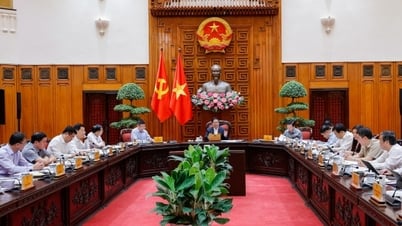



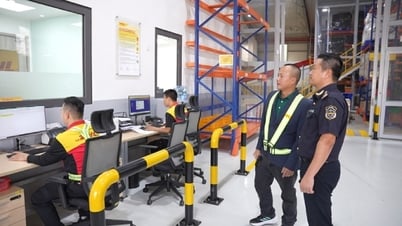












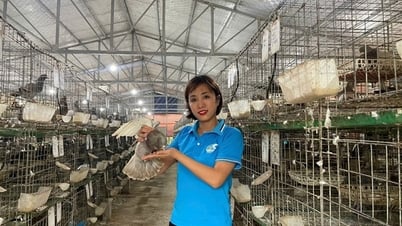

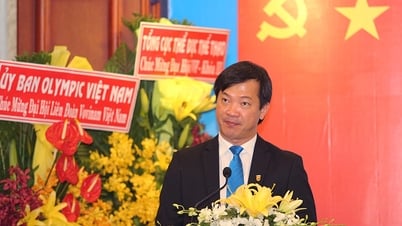















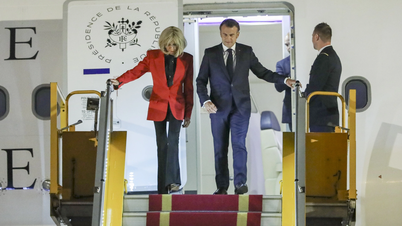
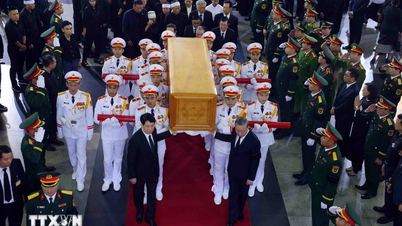
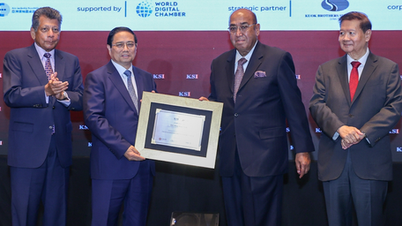

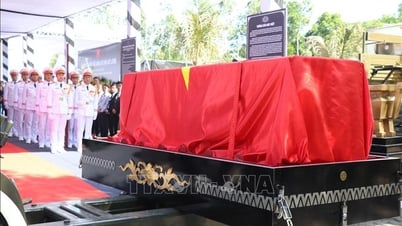



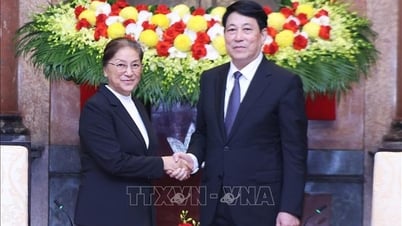





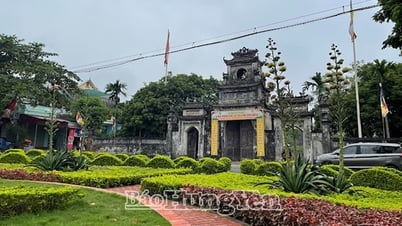



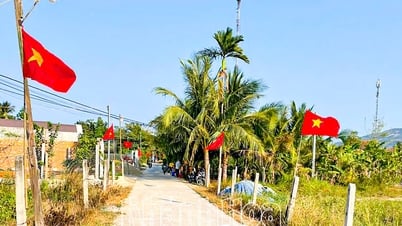




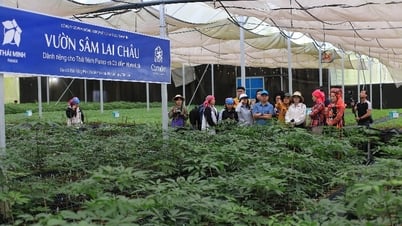



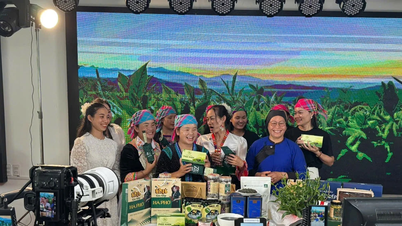







Comment (0)